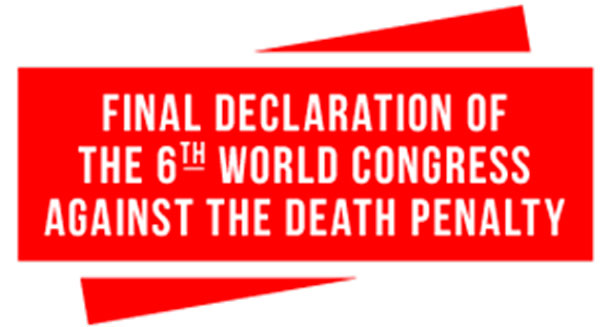World Congress against the Death Penalty calls on retentionist states to ratify Second Optional Protocol to the ICCPR
Retentionist states should “follow the 81 countries that have already ratified the UN Second Optional Protocol to the International Covenant on Civil and Political Rights”, says the Final Declaration of the 6th World Congress Against the Death Penalty, which was held in Oslo on June 21-23.
The Declaration welcomes the fact that “the abolitionist movement is expanding in a world where almost 3/4 of countries have abolished the death penalty in law or in practice; that many abolitionist states and intergovernmental organizations joined the international abolitionist movement and that retentionist states at the congress also expressed their interest in the movement”.
“Since the Madrid World Congress in 2013, 6 countries have abolished the death penalty for all crimes: Madagascar, Mongolia, Nauru, Fiji, the Republic of Congo, and Surinam,” says the document. “The trend toward abolition in the USA continues.”
At the same time, participants of the Congress observe that “re-emergence of terrorist violence on a global scale is used as a pretext by certain governments such as Egypt, to justify the retention of the death penalty to suppress opposition movements”. They are also alarmed by a number of other negative trends, including the use of the death penalty for drug trafficking, application of the punishment to juvenile offenders and people with mental disabilities, as well as that it is applied in a “discriminatory manner according to ethnic, social, national or religious origin, skin color, and sexual orientation”.
“According to Amnesty International; 58 countries and territories retain the death penalty, and often apply it in an arbitrary manner. In 2015, 1,634 persons were executed in the world, notably in Iran, Pakistan, Saudi Arabia, Iraq, the United States, although these statistics do not include the unknown number of people executed in China. Certain countries have resumed executions after lengthy moratoriums, such as Indonesia, Pakistan or Chad,” reads the Declaration.
The Declaration also urges the states that retain the death penalty, including Belarus, to “drastically reduce the scope of crimes punishable by death in their legislation and, in the immediate future, to abolish the mandatory death penalty where it exists; to collect and publish regular and reliable and independent information on the manner in which they apply the death penalty and on the state of public opinion on the death penalty and on alternative punishments; to follow the 81 countries that have already ratified the UN Second Optional Protocol to the International Covenant on Civil and Political Rights.”
The ratification of the Second Optional Protocol to the ICCPR, aiming at the global abolition of the death penalty, is one of the key requirements by both the national campaign Human Rights Defenders against the Death Penalty in Belarus and a number of authoritative international organizations, including Amnesty International, the United Nations, the Council of Europe and the OSCE.


